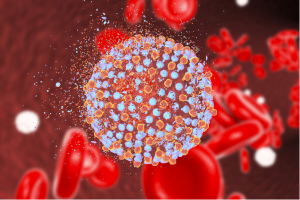Understanding the Serum Ammonia Test: Importance, Procedure, and Results
- 16 Sep, 2024
- Written by Team Dr Lal PathLabs
Medically Approved by Dr. Seema
Table of Contents
Bacteria in the body produce ammonia by breaking down protein. The liver converts this ammonia into urea, which then passes out of the body through urine.
Ammonia is a waste product and can be toxic to the nervous system. When kidney and liver problems occur, urea cannot be excreted from the body. Hence, the level of ammonia in the body rises, leading to complications.
Doctors determine the ammonia level in the body through a blood test called an ammonia test. Understanding the ammonia test can help one discuss the results better with the doctor. This article discusses the ammonia test, why it is done, how to prepare for it, and more.
What is a Serum Ammonia Test?
An ammonia test is a blood test that checks for levels of the chemical ammonia in the body.
High ammonia in blood is toxic to the body. Under normal conditions, ammonia gets converted to urea by the liver, and the kidneys get rid of urea through urine. In case of liver or kidney failure issues, the normal process of urea formation is disrupted, and the ammonia levels in the body increase.
When is an Ammonia Test Done?
An ammonia blood test is usually recommended by the doctor when the following symptoms are present in children or adults:
1. Feeling irritable
2. Feeling extremely tired or sleepy
3. Lack of mental alertness
4. Vomiting
5. headache
6. Loss of muscle coordination
7. Behavioral changes
8. Mood swings
9. Confusion about the time and one’s identity
In children and infants, some additional symptoms can prompt the doctor to order an ammonia test. These are:
1. Not growing taller as expected
2. Not gaining weight as expected
3. Limp muscles
4. Developmental delays
Why is an Ammonia Test Required?
Ammonia test can help in the diagnosis of:
1. Hepatic Encephalopathy: Ammonia buildup in the brain due to liver issues can cause this condition. Symptoms of hepatic encephalopathy include confusion, memory loss, loss of consciousness and coma.
2. Reye Syndrome: Reye syndrome is a rare condition that can damage the brain and the liver. This condition usually occurs in children younger than 15 with fever caused by viral infections such as chicken pox or the flu. Taking aspirin in the fever can increase the risk of Reye syndrome.
3. Urea Cycle Disorders (UCDs): UCDs are a group of rare genetic diseases in which the body lacks the enzyme required to convert ammonia to urea. Parents pass down UCDs to their kids. Symptoms can occur shortly after birth. Infants are usually tested for UCDs as part of routine screening. Symptoms of UCDs in newborns are vomiting, lack of energy, irritability and seizures.
Additionally, doctors can also use ammonia tests to determine whether the treatment for liver-associated problems such as hepatic encephalopathy is working.
How to Prepare for an Ammonia Test?
In preparation for an ammonia test, one can take the following steps:
1. Avoid smoking for several hours before the test.
2. Avoid alcohol consumption for a certain period before the test.
3. Avoid strenuous physical exercise for a certain period before the test.
4. Avoid certain medications before the test, such as diuretics and opioids.
In addition to the above, the doctor can also recommend fasting before the test. Additionally, newborns do not require any special preparations for an ammonia test.
What is the Procedure for an Ammonia Test?
The procedure of an ammonia test is as follows:
1. The doctor or healthcare professional cleans the arm area to collect a blood sample from the vein.
2. Sometimes, a blood sample is taken from the artery, which can require numbing medication.
3. A baby’s blood sample is taken from the heel of one foot.
4. The blood sample is collected in a vial for testing.
The procedure for an ammonia test involves minimal risk. The doctor can advise to avoid lifting heavy objects after the test.
How to Interpret the Test Results of an Ammonia Test?
The normal ammonia levels in the body are 15 to 45 µ/dL.
A higher-than-normal ammonia test can indicate:
1. Bleeding in the stomach, intestines, or other body parts
2. Consumption of alcohol, drugs or certain medications that act as diuretics
3. Smoking
4. Recent strenuous exercise
An ammonia test determines the ammonia levels in the body, which can increase due to kidney and liver problems. High ammonia levels are toxic to the nervous system and require immediate medical attention. Upon noticing symptoms of high ammonia levels, one should consult a doctor and book an ammonia blood test at Dr. Lal PathLabs at a reasonable ammonia test price.
FAQs
1. What are high ammonia level symptoms?
Symptoms of high ammonia levels in the body are:
• Confusion
• Irritability
• Excessive sleepiness
2. What causes high ammonia levels in the body?
Liver problems, kidney problems and urinary cycle disorders can cause higher than normal ammonia levels in the body.















